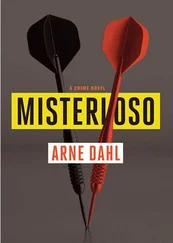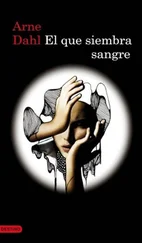Thus the day's misfortunes seemed to culminate in the news of death, which reached them at a quarter to eight and which at once transformed the case into murder.
But it was to get worse.
It was ten-thirty and they sat drinking coffee, hollow-eyed and weary. The telephone rang and Månsson answered.
‘Yes, this is Detective Inspector Månsson.’
And immediately afterwards:
‘I see.’
He repeated the phrase three times before he said goodbye and hung up.
He looked at Skacke and said, ‘This isn't our case any more. They're sending a man down from the National Murder Squad.’
‘Not Kollberg,’ Skacke said anxiously.
‘No, it'll be the one and only Beck. He's coming tomorrow morning.’
‘What'll we do now?’
‘Go home to bed,’ said Månsson and stood up.
When the plane from Stockholm landed at Bulltofta, Martin Beck didn't feel very well.
He'd always had a distinct aversion to flying, and inasmuch as this Friday morning he was also suffering from the effects of the party the night before, the trip had been particularly unpleasant.
The hot, heavy air struck him when he came out of the relatively cool cabin, and he began to sweat even before he'd finished walking down the steps. The tarmac felt soft under his shoe soles as he walked towards the domestic arrivals building.
The air in the taxi was sweltering despite the open window, and the imitation leather covering on the back seat felt red-hot through the thin cloth of his shirt.
He knew that Månsson was waiting for him at the police station, but he decided to go to the hotel first to shower and change. This time he had reserved a room not at the St Jörgen's, as he usually did, but at the Savoy.
The doorman greeted him so exuberantly that for an instant Martin Beck suspected that he was being confused with a long-lost guest of great importance.
The room was airy and cool, facing north. From the window he could see the canal and the railway station and beyond the harbour and Kockum's wharf, a white hydrofoil, which was just disappearing into the pale blue haze on its way over the Sound to Copenhagen.
Martin Beck undressed and walked around the room naked while he unpacked his suitcase. Then he went into the bathroom and took a long, cold shower.
He put on clean underclothes and a fresh shirt, and when he had finished dressing he noticed that the time on the clock at the train station was twelve exactly. He took a cab to the main police station and walked directly up to Månsson's room.
Månsson had the windows wide open on to the courtyard, which lay in shadow at this time of day. He was in shirt sleeves, drinking beer while he leafed through a bundle of papers.
After they had greeted each other, and Martin Beck had taken off his jacket, settled down in the extra armchair and lit a Florida, Månsson handed him the bundle of papers.
‘For a start you can take a look at this report. As you'll see, the whole thing was handled badly from the very beginning.’
Martin Beck read through the papers carefully and now and then put questions to Månsson, who filled in with details that weren't in the report. Månsson also recounted Rönn's slightly modified version of Kristiansson's and Kvant's behaviour on Karolinskavägen. Gunvald Larsson had refused to have anything more to do with the case.
When Martin Beck had finished reading, he laid the transcripts on the table in front of him and said, ‘It's obvious that we'll have to first concentrate on questioning the witnesses properly. This really hasn't been very productive. What do they mean, anyway, by this curious phrase?’
He hunted out a piece of paper and read, ‘“The deviation from the correct time of various clocks existent on the scene of the crime at the moment of the commission of the crime …” Does that mean anything?’
Månsson shrugged.
‘That's Backlund,’ he said. ‘You've met Backlund?’
‘Oh, him. I see,’ said Martin Beck.
He had met Backlund. Once. Several years ago. That was enough.
A car drove into the courtyard and stopped below the window. Then noises were heard, car doors being slammed shut, people running and loud voices shouting something in German.
Månsson got up slowly and looked out.
‘They must have made a clean sweep on Gustav Adolf Square,’ be said, ‘or down by the wharves. We've stepped up surveillance there, but it's mostly teenagers who have a little hash for their own use who get picked up. We seldom get at the big shipments and the really dangerous dealers.’
‘Same thing with us.’
Månsson shut the window and sat down.
‘How's Skacke doing?’ Martin Beck asked.
‘Fine,’ Månsson said. ‘He's an ambitious boy. Sits at home and studies every night. He does a good job, too, very careful and doesn't do anything rash. He really learned a lesson that time. He was very relieved, by the way, when he heard that you were coming, and not Kollberg.’
Less than a year before, Benny Skacke had been more or less the direct cause of Kollberg's being stabbed in the stomach by a man that both of them were going to arrest at Arlanda airport.
‘Good reinforcement for the football team too, I hear,’ Månsson said.
‘Is that so?’ said Martin Beck disinterestedly. ‘What's he doing right now?’
‘He's trying to get hold of that man who was sitting alone several tables away from Palmgren's party. His name is Edvardsson, and he's a proofreader for Arbetet. He was too drunk to be questioned last Wednesday, and yesterday we couldn't get hold of him. He was probably at home with a hangover and refused to answer the door.’
‘If he was drunk when Palmgren was shot, maybe he's not worth much as a witness,’ Martin Beck said. ‘And when can we question Palmgren's wife?’
Månsson took a swallow of beer and wiped his mouth on the back of his hand.
‘This afternoon, I hope. Or tomorrow. Do you want to deal with her?’
‘Maybe it'd be better if you did it yourself. You must know more about Palmgren than I do.’
‘I doubt it,’ Månsson said. ‘But okay, you're the one to decide. You can talk to Edvardsson, if Skacke gets hold of him. I have a feeling that he's the most important witness so far, despite everything. Would you like a beer? It's warm, I'm afraid.’
Martin Beck shook his head. He was extremely thirsty, but warm beer didn't appeal to him.
‘Why don't we go up to the canteen and have some mineral water instead?’ he said.
They each drank a bottle of mineral water standing at the bar and then returned to Månsson's room. Benny Skacke was sitting in the extra chair reading something from his notepad. He stood up quickly when they came in, and he and Martin Beck shook hands.
‘Well, did you get hold of Edvardsson?’ Månsson asked.
‘Yes, eventually. He's at the newspaper right now, but should be home about three o'clock,’ Skacke said.
He looked at his notes.
‘Kamrergatan 2.’
‘Call and say that I'll come at three,’ Martin Beck said.
The building on Kamrergatan seemed to be the first finished in a series of new structures; on the other side of the street were squat, old houses that had been vacated and would soon fall prey to bulldozers to make room for newer and larger blocks of flats.
Edvardsson lived on the top floor and opened the door soon after Martin Beck had rung the bell. About fifty years old, he had an intelligent face with a prominent nose and deep furrows around his mouth. He squinted at Martin Beck before he threw open the door and said, ‘Superintendent Beck? Come in.’
Martin Beck preceded him into the room, which was frugally furnished. The walls were covered with book shelves, and on the desk by the window was a typewriter with a half-typed sheet of paper in the platen.
Читать дальше












